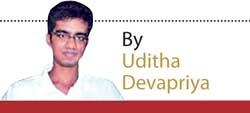Reply To:
Name - Reply Comment
Last Updated : 2024-04-25 06:31:00

 There are those who believe that English is some sort of gateway to the world outside. Without an at least rudimentary knowledge of the language, it is argued, one can’t get through one’s education and career, and presumably, one’s life. And it’s not just the ability to read and write, which is essentially what counts for literacy today; it’s also, more importantly, the ability to speak it well. The rising tide of Spoken English tuition classes on the one hand and the rampant proliferation of international schools on the other point at the fact that a great many non English speakers take this notion of the language seriously.
There are those who believe that English is some sort of gateway to the world outside. Without an at least rudimentary knowledge of the language, it is argued, one can’t get through one’s education and career, and presumably, one’s life. And it’s not just the ability to read and write, which is essentially what counts for literacy today; it’s also, more importantly, the ability to speak it well. The rising tide of Spoken English tuition classes on the one hand and the rampant proliferation of international schools on the other point at the fact that a great many non English speakers take this notion of the language seriously.
I wonder whether we’re overhyping it. Without taking away from the fact that a language used by more than one-fifth of the world can be definitively considered as a lingua franca, English was, is, and will always be a secondary language, its popularity now more or less being taken over by other tongues. In fact ethnologue.com points at an interesting trend: while English is spoken in the most number of countries (137), the number of people who speak it (379 million) is less than the corresponding figure for Spanish (460 million) and Chinese (a whopping 1,311 million).
If the argument that, because of this, English can no longer be taken as the linguistic lever of privilege it was, doesn’t hold in our country – where Chinese and Spanish aren’t spoken that much – there is, of course, another argument to make.
While English is spoken in the most number of countries (137), the number of people who speak it (379 million) is less than the corresponding figure for Spanish (460 million) and Chinese (1,311 million)
This other argument is that, as with most of the 136 other countries, Sri Lanka still resorts to English as a language of privilege. What it means is that English is a marker of prestige, concentrated in urban areas, and promoted by the private sector. What that means is that a candidate for a job who knows and speaks Sinhala and Tamil well, but is unable to speak English as fluently, will be passed over in favour of a candidate who is not handicapped by that latter limitation.
In short, what it means is that in a context where the world is letting go of its fixation with the language of Shakespeare, Milton, and Ed Sheeran, we haven’t kept up to date on language trends, instead wallowing in the belief that because English is spoken everywhere, it needs to be privileged over the vernaculars.
The results are only too clear. We get the worst of both worlds: English is taught in a haphazard, less than satisfactory manner (that’s putting it too mildly), and Sinhala and Tamil, while certainly not neglected, is getting more and more marginalised. Here the problem becomes clearer if you take into account the point that compared to English, the vernaculars are more difficult, more complex, and more rich.
The problems this has spawned are only too clear; it has led to a rise in the number of international schools that have embraced the worst of both worlds: shoddy English, and little to no Sinhala (and Tamil). That such schools should or shouldn’t be shut down is, however, not the problem. The problem goes deeper.
Many of those who lived through the monolingual era of our post-independence history (I periodise this from the time of “Sinhala Only” to the time when English was reintroduced as a medium of instruction in the 2000s) grew up disillusioned by the shortcomings of monolingual education; their experiences turned them into some of the most fervent promoters of English education later on.

While there are no statistics that can verify it, this generation, I feel, in part facilitated the transition in the country from Sinhala to English. This was the generation that, having studied at vernacular schools, sent their children to international schools; the generation that embraced “English Our Way” (despite its shortcomings) when it was implemented in 2009; the generation that, in short, have been faulted by writers (like Samaranayake Vipulanga in a recent interview with the Dinamina) as not taking the responsibility of teaching Sinhala to their children seriously.
A nation that lets go of its tongue is cursed to remain dumb forever. A nation that is not moored in its own language, and its past, is cursed to remain unmoored from the rest of the world which its inhabitants clamour to join. The significance of this can’t be overemphasised no matter which way you choose to look at it.
Sinhala, in particular, presents an interesting conundrum. With its extensive range of inflections and conjugations, of gendered verbs and complex demonstratives, it is far more complicated and multifarious than English. As with all such complicated and multifarious languages, it is also in danger of falling into neglect. Nowhere else has this been more discernibly felt than in the realm of popular culture.
This was the generation that, having studied at vernacular schools, sent their children to international schools; the generation that embraced “English Our Way” when it was implemented in 2009
The link between a nation’s language and its popular culture and media has been studied and verified by academics. Chomsky’s argument that “language is a process of free creation” and Clifford Geertz’s description of its goal as enlarging “the possibility of intelligible discourse among people quite different from each other” both validate the view that language is not just open to our interpretation, but is also in itself subject to interpretation in our hands, refracted through the culture that its speakers inhabit. In linguistics as in social relations, hence, people do make their own history, “but not as they please”, owing to circumstances beyond their choosing.
The differentiations in language this has lead to can be historical and contemporary, as I see it; the historical (or cultural) differentiations being the dialects in Sinhala found throughout the country, and the contemporary differentiations being the “creolisation” of Sinhala resulting from “bourgeoisification” of culture and the intrusion of various foreign accretions on the development of the vernacular.
The historical differentiations have gradually developed, in keeping with the tide of evolution; the contemporary differentiations, though, have been arbitrary at best, and confusing at worst. The issue or the challenge is to be able to distinguish the one from the other. Or, in other words, to be able to facilitate the evolution of the language, and not stunt it through arbitrary accretions.

Popular culture, however, has made it difficult for us to distinguish between the two. Just what is evolutionary and what is not, in the context of a language?
When G. B. Senanayake, Siri Gunasinghe, and Ajith Tilakasena went against the grammar and syntactical structures of Sinhala in their work, they encountered hostility everywhere. They were shaped by a Western education that had set them apart from writers who had studied at pirivenas (Chandrarathna Manawasinghe), were self taught (Martin Wickramasinghe), or had studied in English schools, only to reject Western aesthetics later on (Gunadasa Amarasekara).
In doing away with the na-na la-la bedaya, Gunasinghe wasn’t conveniently playing around with the tropes of the language; he was attempting to modernise it. One can disagree with what he did on the grounds that by doing away with what was obviously a taken for granted linguistic truism, he did away with the need to be aware of that truism in the first place. The nisadas he and Senanayake introduced to the country, to the consternation of Wickramasinghe and the later Amarasekara, can on that basis be criticised as having done away with the need to master the quatrain structure, without which poetry deteriorated into a mass of abstractions that Amarasekara would, not entirely without reason, derogatorily term as “gutha theravili.”
That was a time of deeply resonant intellectual activity. People were watching Kurosawa in the theatres; they were reading not just Shakespeare, Milton, and Austen, as our English Departments are now, but also Joyce, Hemingway, and Faulkner; they were listening to not just Beethoven and Mozart, but also the Platters, Elvis, and Bing Crosby. The period immediately following “Sinhala Only” was consequently marked by a renaissance the likes of which we never encountered thereafter and perhaps never will; the sort that served, despite the divisions between the purists, the modernists, and the moderates, to enrich the language, and the culture.
53 years after 1956, where have we gone to in this scheme of things? I won’t consider us a dumb nation; that would be to belittle the many strides in culture and language we have made over the last five decades. But to compensate for those strides perhaps, in a rather insidious way, we have turned into a gandabba nation. Ensnared by the allure of “modernisation”, we have let go of both English and Sinhala. A friend of mine put it very aptly the other day: “We are at a moment when we have abandoned Sinhala, but haven’t mastered English either.” Sad.
UDAKDEV1@GMAIL.COM

Add comment
Comments will be edited (grammar, spelling and slang) and authorized at the discretion of Daily Mirror online. The website also has the right not to publish selected comments.
Reply To:
Name - Reply Comment
US authorities are currently reviewing the manifest of every cargo aboard MV
On March 26, a couple arriving from Thailand was arrested with 88 live animal
According to villagers from Naula-Moragolla out of 105 families 80 can afford
Is the situation in Sri Lanka so grim that locals harbour hope that they coul